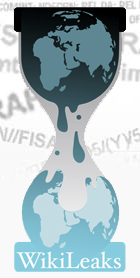[Every Friday, Mark Coddington sums up the week’s top stories about the future of news and the debates that grew up around them. —Josh]
![]() Only one topic really grabbed everyone’s attention this week in future-of-news circles (and most of the rest of the world, too): WikiLeaks. To make the story a bit easier to digest, I’ve divided it into two sections — the crackdown on WikiLeaks, and its implications for journalism.
Only one topic really grabbed everyone’s attention this week in future-of-news circles (and most of the rest of the world, too): WikiLeaks. To make the story a bit easier to digest, I’ve divided it into two sections — the crackdown on WikiLeaks, and its implications for journalism.
 Attacks and counterattacks around WikiLeaks: Since it released 250,000 confidential diplomatic cables last week, WikiLeaks and its founder, Julian Assange, have been at the center of attacks by governments, international organizations, and private businesses. The forms and intensity they’ve taken have seemed unprecedented, though Daniel Ellsberg said he faced all the same things when he leaked the Pentagon Papers nearly 40 years ago.
Attacks and counterattacks around WikiLeaks: Since it released 250,000 confidential diplomatic cables last week, WikiLeaks and its founder, Julian Assange, have been at the center of attacks by governments, international organizations, and private businesses. The forms and intensity they’ve taken have seemed unprecedented, though Daniel Ellsberg said he faced all the same things when he leaked the Pentagon Papers nearly 40 years ago.
Here’s a rundown of what’s happened since late last week: Both Amazon and the domain registry EveryDNS.net booted WikiLeaks, leaving it scrambling to stay online. (Here’s a good conversation between Ethan Zuckerman and The Columbia Journalism Review on the implications of Amazon’s decision.) PayPal, the company that WikiLeaks uses to collect most of its donations, cut off service to WikiLeaks, too. PayPal later relented, but not before botching its explanation of whether U.S. government pressure was involved.
On the government side, the Library of Congress blocked WikiLeaks, and Assange surrendered to British authorities on a Swedish sexual assault warrant (the evidence for which David Cay Johnston said the media should be questioning) and is being held without bail. Slate’s Jack Shafer said the arrest could be a blessing in disguise for Assange.
WikiLeaks obviously has plenty of critics: Christopher Hitchens called Assange a megalomaniac who’s “made everyone complicit in his own private decision to try to sabotage U.S. foreign policy,” and U.S. Sens. Dianne Feinstein and Joe Lieberman called for Assange and The New York Times, respectively, to be prosecuted via the Espionage Act. But WikiLeaks’ many online defenders also manifested themselves this week, too, as hundreds of mirror sites cropped up when WikiLeaks’ main site was taken down, and various online groups attacked the sites of companies that had pulled back on services to WikiLeaks. By Wednesday, it was starting to resemble what Dave Winer called “a full-out war on the Internet.”
Search Engine Land’s Danny Sullivan looked at the response by WikiLeaks’ defenders to argue that WikiLeaks will never be blocked, and web pioneer Mark Pesce said that WikiLeaks has formed the blueprint for every group like it to follow. Many other writers and thinkers lambasted the backlash against WikiLeaks, including Reporters Without Borders, Business Insider’s Henry Blodget, Roberto Arguedas at Gizmodo, BoingBoing’s Xeni Jardin, Wired’s Evan Hansen, and David Samuels of The Atlantic.
Four defenses of WikiLeaks’ rights raised particularly salient points: First, NYU prof Clay Shirky argued that while WikiLeaks may prove to be damaging in the long run, democracy needs it to be protected in the short run: “If it’s OK for a democracy to just decide to run someone off the internet for doing something they wouldn’t prosecute a newspaper for doing, the idea of an internet that further democratizes the public sphere will have taken a mortal blow.” Second, CUNY j-prof Jeff Jarvis said that WikiLeaks fosters a critical power shift from secrecy to transparency.
Finally, GigaOM’s Mathew Ingram and Salon’s Dan Gillmor made similar points about the parallel between WikiLeaks’ rights and the press’s First Amendment rights. Whether we agree with them or not, Assange and WikiLeaks are protected under the same legal umbrella as The New York Times, they argued, and every attack on the rights of the former is an attack on the latter’s rights, too. “If journalism can routinely be shut down the way the government wants to do this time, we’ll have thrown out free speech in this lawless frenzy,” Gillmor wrote.
WikiLeaks and journalism: In between all the attacks and counterattacks surrounding him, Julian Assange did a little bit of talking of his own this week, too. He warned about releasing more documents if he’s prosecuted or killed, including possible Guantánamo Bay files. He defended WikiLeaks in an op-ed in The Australian. He answered readers’ questions at The Guardian, and dodged one about diplomacy that started an intriguing discussion at Jay Rosen’s Posterous. When faced with the (rather pointless) question of whether he’s a journalist, he responded with a rather pointless answer.
Fortunately, plenty of other people did some deep thinking about what WikiLeaks means for journalism and society. (The Atlantic’s Alexis Madrigal has a far more comprehensive list of those people’s thoughts here.) Former Guardian web editor Emily Bell argued that WikiLeaks has awakened journalism to a renewed focus on the purpose behind what it does, as opposed to its current obsession with the models by which it achieves that purpose. Here at the Lab, USC grad student Nikki Usher listed a few ways that WikiLeaks shows that both traditional and nontraditional journalism matter and pointed out the value of the two working together.
At the Online Journalism Review, Robert Niles said that WikiLeaks divides journalists into two camps: “Those who want to see information get to the public, by whatever means, and those who want to control the means by which information flows.” Honolulu Civil Beat editor John Temple thought a bit about what WikiLeaks means for small, local news organizations like his, and British j-prof Paul Bradshaw used WikiLeaks as a study in how to handle big data dumps journalistically.
Also at the Lab, CUNY j-prof C.W. Anderson had some thoughts about this new quasi-source in the form of large databases, and how journalists might be challenged to think about it. Finally, if you’re looking for some deep thoughts on WikiLeaks in audio form, Jay Rosen has you covered — in short form at PBS MediaShift, and at quite a bit more length with Dave Winer on their Rebooting the News podcast.
How porous should paywalls be?: Meanwhile, the paid-content train chugs along, led by The New York Times, which is still planning on instituting its paywall next year. The Times’ digital chief, Martin Nisenholtz, dropped a few more details this week about how its model will work, again stressing that the site will remain open to inbound links across the web.
 But for the first time, Nisenholtz also stressed the need to limit the abuse of those links as a way to get inside the wall without paying, revealing that The Times will be working with Google to limit the number of times a reader can access Times articles for free via its search. Nisenholtz also hinted at the size of the paywall’s target audience, leading Poynter’s Rick Edmonds to estimate that The Times will be focusing on about 6 million “heavy users of the site.”
But for the first time, Nisenholtz also stressed the need to limit the abuse of those links as a way to get inside the wall without paying, revealing that The Times will be working with Google to limit the number of times a reader can access Times articles for free via its search. Nisenholtz also hinted at the size of the paywall’s target audience, leading Poynter’s Rick Edmonds to estimate that The Times will be focusing on about 6 million “heavy users of the site.”
Reuters’ Felix Salmon was skeptical of Nisenholtz’s stricter paywall plans, saying that they won’t be worth the cost: “Strengthening your paywall sends the message that you don’t trust your subscribers, or your subscribers’ non-subscriber friends: you’re treating them as potential content thieves.” The only way such a strategy would make sense, he said, is if The Times is considering starting at a very high price point, something like $20 a month. Henry Blodget of Business Insider, on the other hand, is warming to the idea of a paywall for The Times.
In other paid-content news: News Corp.’s Times of London, which is running a very different paywall from The New York Times, may have only 54,000 people accessing content behind it, according to research by the competing Guardian. The Augusta (Ga.) Chronicle announced it’s launching an metered model powered by Steve Brill’s Press+, a plan Steve Yelvington defended and Matthew Terenzio questioned.
While one paid-content plan gets started, another one might be coming to an end: Newsday is taking its notoriously unsuccessful paywall down through next month, and several on Twitter guessed that the move would become permanent. One news organization that’s not going to be a pioneer in paid online news: The Washington Post, as Post Co. CEO Don Graham said at a conference this week.
Reading roundup: Other than the ongoing WikiLeaks brouhaha, it’s been a relatively quiet week on the future-of-news front. Here’s a bit of what else went on:
— Web guru Tim O’Reilly held his News Foo Camp in Arizona last weekend, and since it was an intentionally quiet event, it didn’t dominate the online discussion like many such summits do. Still, there were a few interesting post-Newsfoo pieces for the rest of us to chew on, including a roundup of the event by TBD’s Steve Buttry, Alex Hillman’s reflections, and USC j-prof Robert Hernandez’s thoughts on journalists’ calling a lie a lie.
— A few iPad bits: News media marketer Earl Wilkinson wrote about a possible image problem with the iPad, All Things Digital’s Peter Kafka reported on the negotiations between Apple and publishers on iTunes subscriptions, and The New York Times’ David Nolen gave some lessons from designing election results for the iPad.
— The Guardian’s Sarah Hartley interviewed former TBD general manager Jim Brady about the ambitious local online-TV project, and Lost Remote’s Cory Bergman looked at TBD and other local TV online branding efforts.
— Advertising Age’s Ann Marie Kerwin has an illuminating list of 10 trends in global media consumption.
— Finally, two good pieces from the Lab: Harvard prof Nicholas Christakis on why popularity doesn’t equal influence on social media, and The New York Times’ Aron Pilhofer and Jennifer Preston provided a glimpse into how one very influential news organization is evolving on social media.